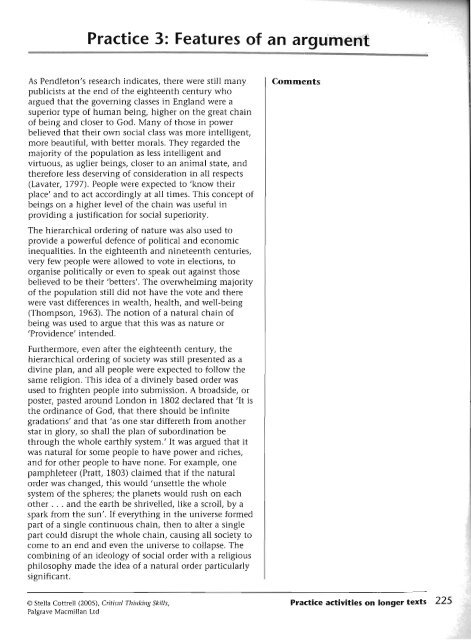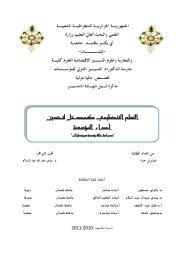Critical Thinking Skills - Developing Effective Analysis and Argument(2)
Critical Thinking Skills - Developing Effective Analysis and Argument(2)
Critical Thinking Skills - Developing Effective Analysis and Argument(2)
Create successful ePaper yourself
Turn your PDF publications into a flip-book with our unique Google optimized e-Paper software.
Practice 3: Features of an argument<br />
As Pendleton's research indicates, there were still many<br />
publicists at the end of the eighteenth century who<br />
argued that the governing classes in Engl<strong>and</strong> were a<br />
superior type of human being, higher on the great chain<br />
of being <strong>and</strong> closer to God. Many of those in power<br />
believed that their own social class was more inteIligent,<br />
more beautiful, with better morals. They regarded the<br />
majority of the population as less intelligent <strong>and</strong><br />
virtuous, as uglier beings, closer to an animal state, <strong>and</strong><br />
therefore less deserving of consideration in all respects<br />
(Lavater, 1797). People were expected to 'know their<br />
place' <strong>and</strong> to act accordingly at all times. This concept of<br />
beings on a higher level of the chain was useful in<br />
providing a justification for social superiority.<br />
The hierarchical ordering of nature was also used to<br />
provide a powerful defence of political <strong>and</strong> economic<br />
inequalities. In the eighteenth <strong>and</strong> nineteenth centuries,<br />
very few people were allowed to vote in elections, to<br />
organise politically or even to speak out against those<br />
believed to be their 'betters'. The overwhelming majority<br />
of the population still did not have the vote <strong>and</strong> there<br />
were vast differences in wealth, health, <strong>and</strong> welI-being<br />
(Thompson, 1963). The notion of a natural chain of<br />
being was used to argue that this was as nature or<br />
'Providence' intended.<br />
Furthermore, even after the eighteenth century, the<br />
hierarchical ordering of society was still presented as a<br />
divine plan, <strong>and</strong> all people were expected to follow the<br />
same religion. This idea of a divinely based order was<br />
used to frighten people into submission. A broadside, or<br />
poster, pasted around London in 1802 declared that 'It is<br />
the ordinance of God, that there should be infinite<br />
gradations' <strong>and</strong> that 'as one star differeth from another<br />
star in glory, so shall the plan of subordination be<br />
through the whole earthly system.' It was argued that it<br />
was natural for some people to have power <strong>and</strong> riches,<br />
<strong>and</strong> for other people to have none. For example, one<br />
pamphleteer (Pratt, 1803) claimed that if the natural<br />
order was changed, this would 'unsettle the whole<br />
system of the spheres; the planets would rush on each<br />
other . . . <strong>and</strong> the earth be shrivelled, like a scroll, by a<br />
spark from the sun'. If everything in the universe formed<br />
part of a single continuous chain, then to alter a single<br />
part could disrupt the whole chain, causing all society to<br />
come to an end <strong>and</strong> even the universe to collapse. The<br />
combining of an ideology of social order with a religous<br />
philosophy made the idea of a natural order particularly<br />
significant.<br />
O Stella Cottrell (2005), <strong>Critical</strong> Thirzkir~g <strong>Skills</strong>,<br />
Palgrave Macmillan Ltd<br />
Comments<br />
Practice activities on longer texts 225



